Every year, TiE Chennai organizes their annual mega event celebrating entrepreneurship called TiECON where we get to hear talks by industry leaders and panel discussions by experts and rising stars. This year too was no different and this post is from my notes.
Yesterday it was the awards night which celebrated entrepreneurs from various fields. The lifetime achiever award was presented to Dr Ashok Jhunjhunwala, Professor in the Department of Electrical Engineering, Indian Institute of Technology, Madras. The sustainable business award went to my friend Mr Gowri Shankar Subramanian, CEO of Aspire Systems and his team. The evening was accompanied by melodious music by flautist J.A. Jayanth and his associates.
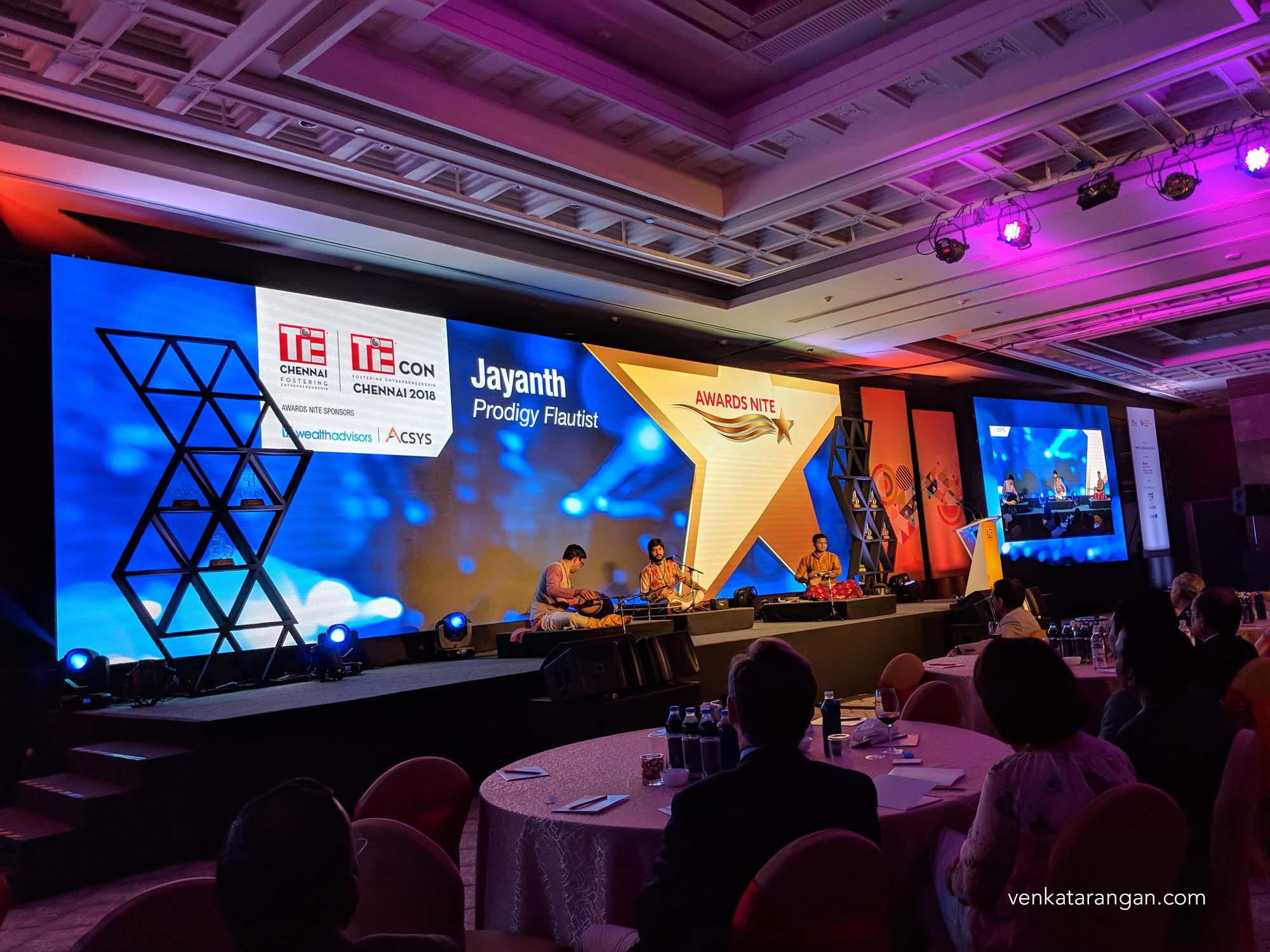
Carnatic Flute J A. Jayanth
PC Mustafa of iD Fresh Foods:
His energy and conviction of him were infectious. With a set of five stories from his journey of building a ₹1000 crore company, he delivered an engaging talk.
- Mistake – When one of their earliest customer, a store manager in Bangalore called and complained of a bomb blast of one of their batter pack. This led to the reading and understanding of the process of fermentation. Lesson learnt: Don’t wait for full knowledge, learn as you go.
- Chennai batter failure, where they couldn’t compete with a competitor who was using Public Distribution Rice bought at Re.1 and selling at an incredibly low price and low quality by adding Soda Salt. Lesson learnt: It is better to exit a market and come back with a better strategy/better time rather than compromise on the quality.
- Conquering the idli business by focussing on a single product and do it well. During the Chennai 2015, the distribution of free batter to affected people earned a lot of goodwill and it was the right thing to do. Lesson learnt: Have the courage to take the road less travelled.
- The only way to make the customer to trust you, especially when you are making a product that is going to affect the health of the customer’s children, is for you the brand to trust the customer more. iD did this by installing self-service open coolers stocked with all their products where the customer has to pay cash with no cameras or vending machine powering the arrangement. Lesson learnt: You trust the customer back. Be the change you want to see
- The biggest innovations are inspired by common sense, like in their new product – a squeeze pack for making perfect vadas. Common sense is the important ingredient for innovation.
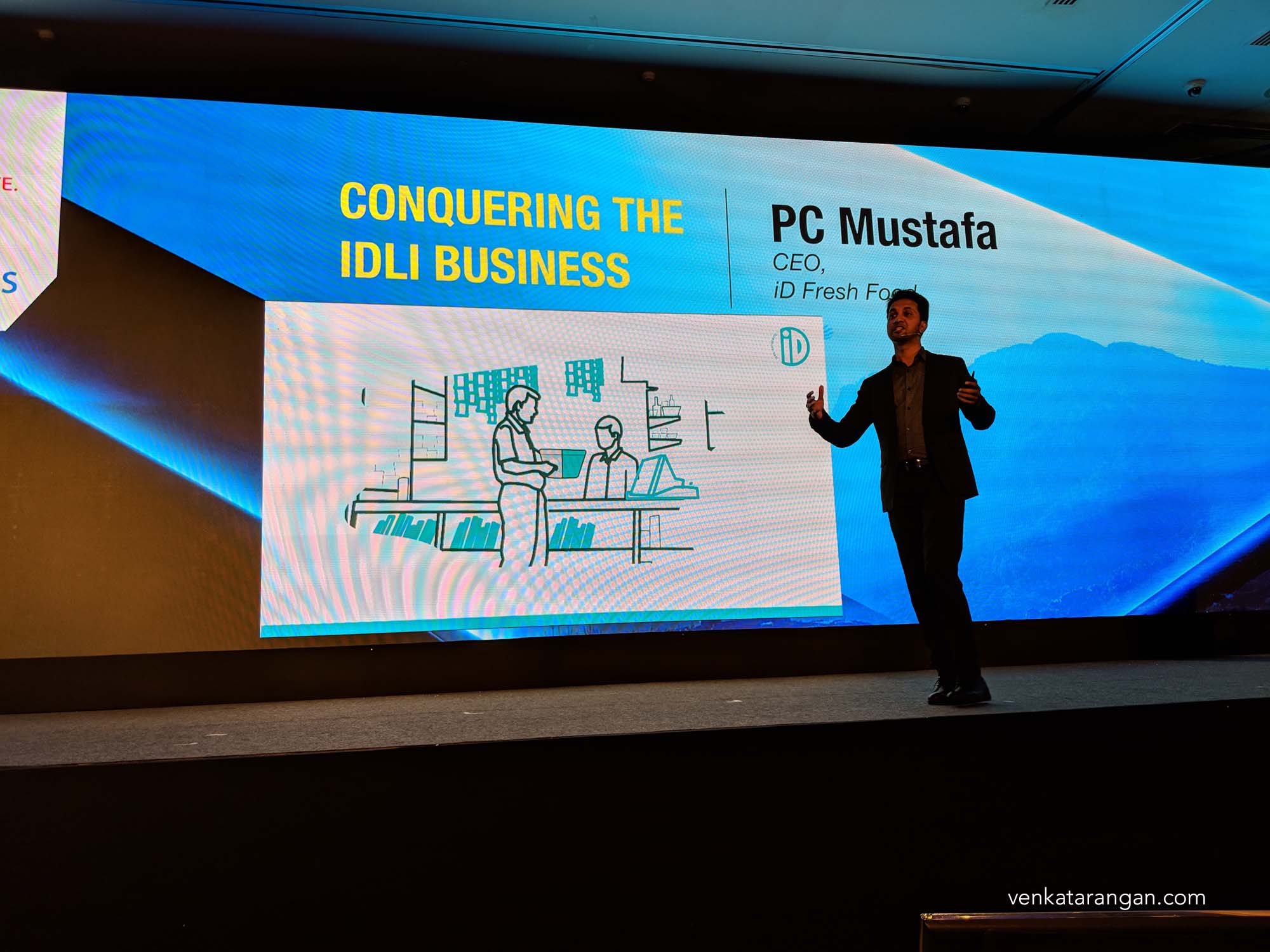
PC Mustafa of iD Fresh Foods
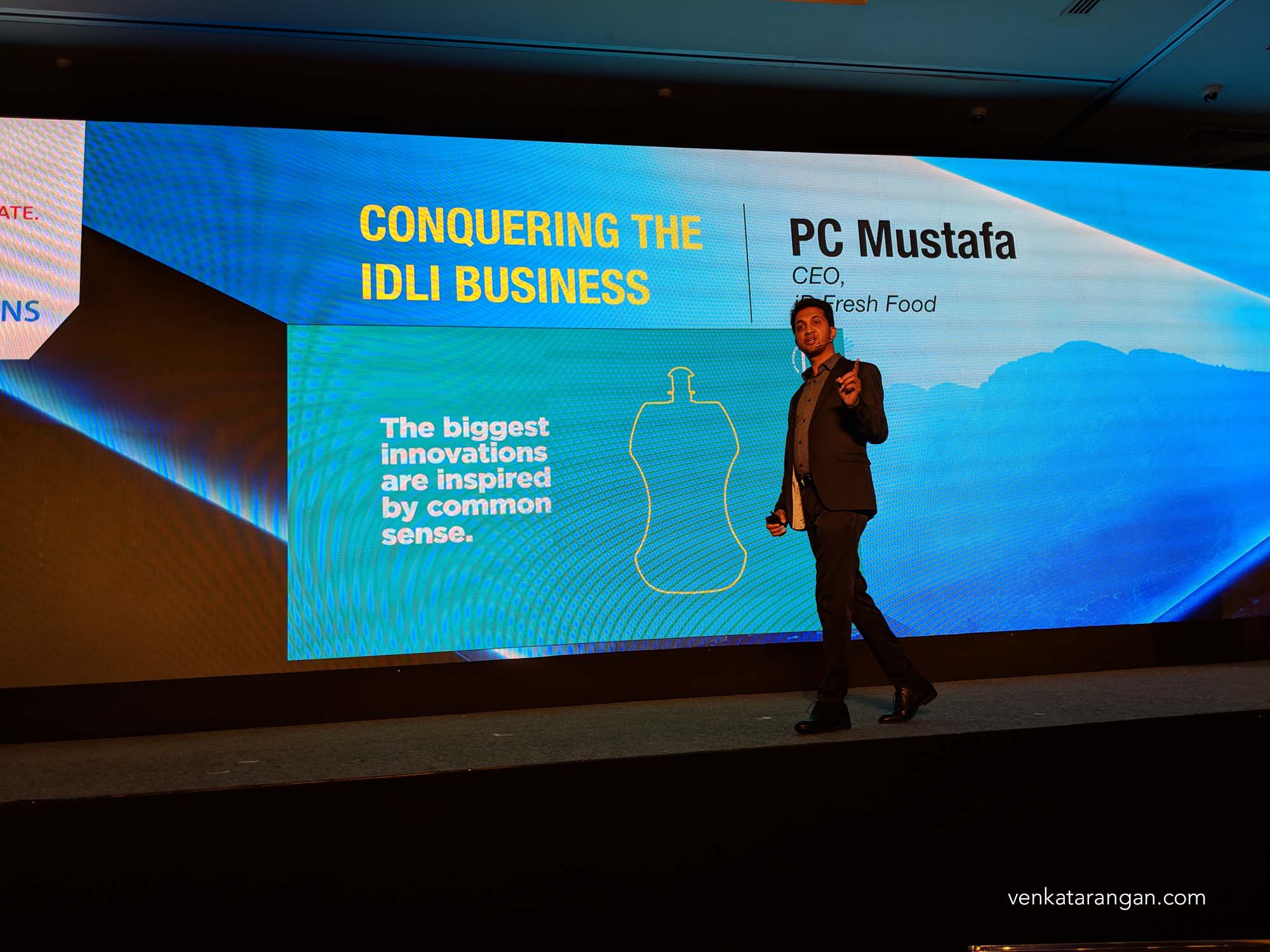
iD Fresh Foods new innovation – a squeeze pack to make perfect vada
Jessie Paul, Paul Writer Strategic Advisory:
[Update: Recording of the talk on YouTube]Talked of how your honest questioning about what you are offering is the first step towards marketing your brand. In a cluttered world, for your brand to stand out you need to be genuine and offer a clear value proposition.
Jessie Paul was talking passionately about the lack of simplicity. In In,dia our businesses complicate on the options presented to their customers. They should make is short easy and less complicated.
She advised the audience to come up individually with the following superlatives for their business:
- I’m the best at —
- I’m the only —
- I’m the biggest — and so —
- I’m the cheapest — because —
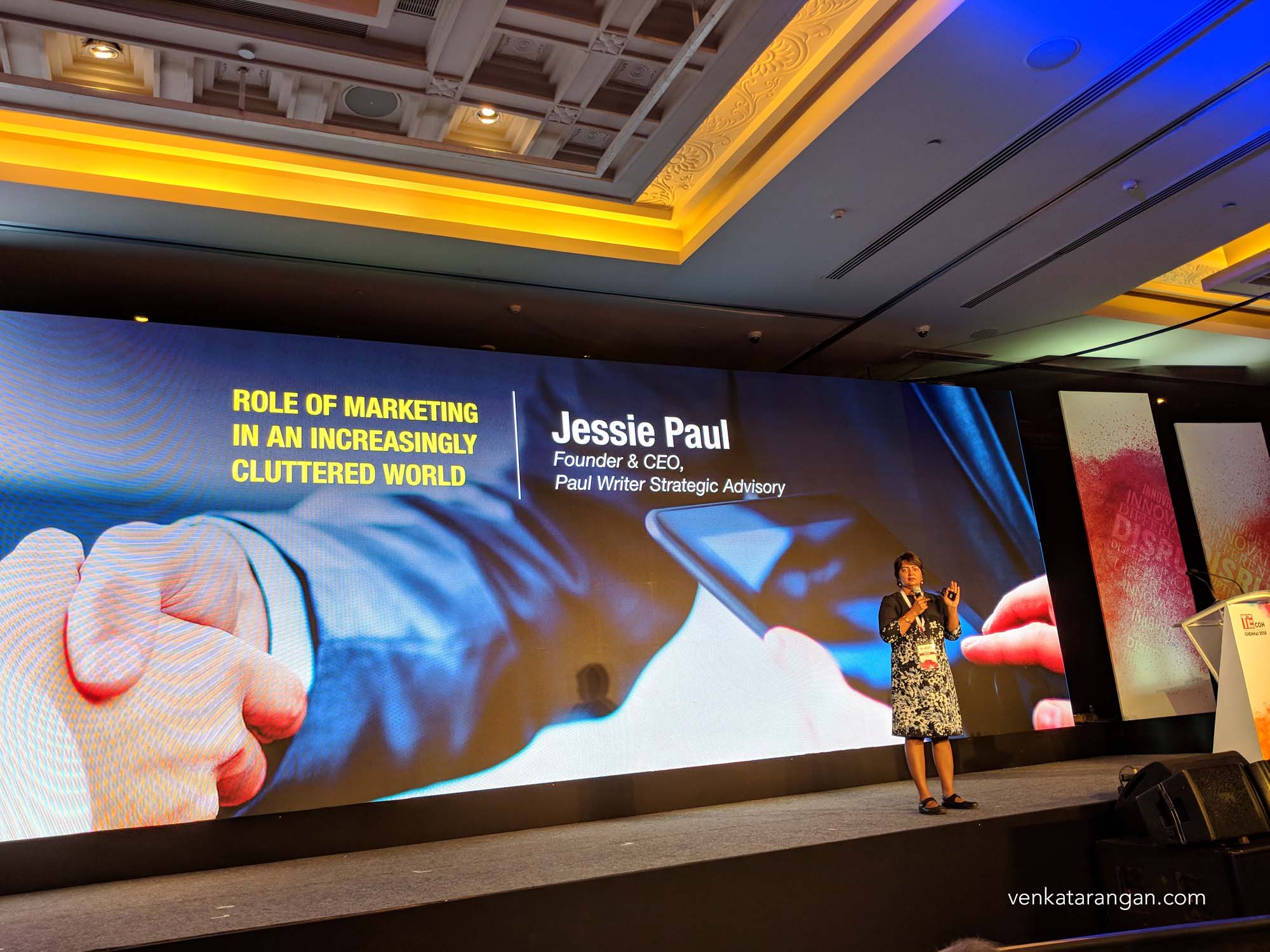
Jessie Paul, Paul Writer Strategic Advisory
Bharath Krishna Sankar, Aparajitha corporate Services Ltd:
[Update: Recording of the talk on YouTube]He talked of 4Cs – Captain, Compass, Chief, Competence, that are needed for every leader.
And of Seven qualities: TOPP GEM:
- Trust – you aren’t entitled to trust
- Openness – don’t get carried by the Ego of your success. Be open for criticism.
- Patience – I practice my patience. Be impatient for action, patient for results. பொறுமை ஒரு தவம் அதற்கு வரம் வராமல் இருக்காது.
- Poise – இதுவும் கடந்து போகும்.
- Genuine – be direct. Be genuine for the balance sheet of the organization. Different from house and home. Express genuinity.
- Empathy – புரிந்துணர்வு. If the boss decided to play god, that his hands can write the gate of his employees, and his employees play the victim company is doomed.
- Maturity – you have to respond to the situation, then to react to people. You have to be more mature with immature people.
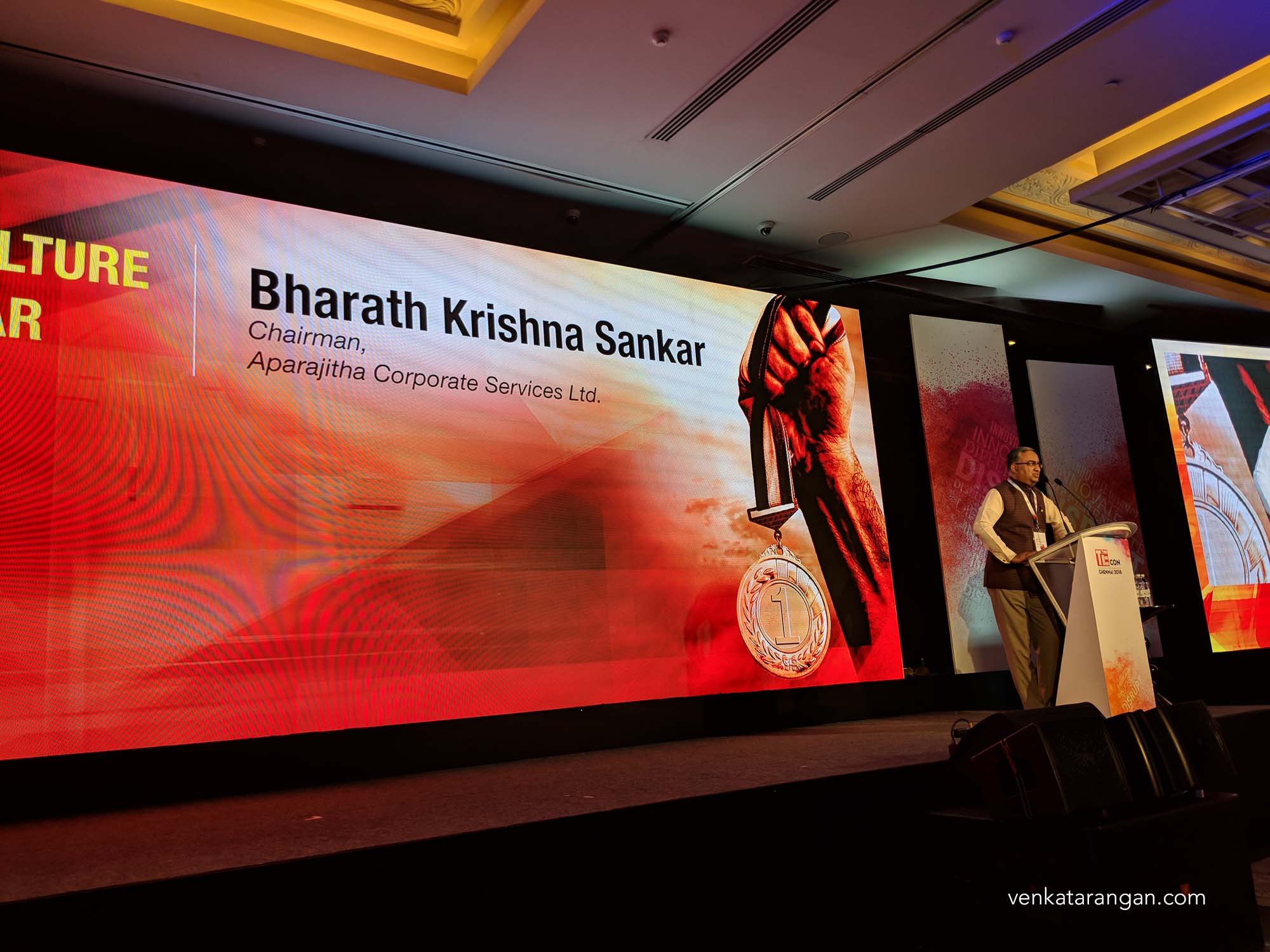
Bharath Krishna Sankar, Aparajitha Corporate Services Ltd
Ajit Isaac, Chairman and MD of Quess Corp:
Talked about how Quess is powering India’s economic growth through their varied businesses and acquisitions. Their mantra for acquisition is for businesses that have proven returns on investment and scalability. Each of their businesses is run independently with corporate office coordinating the basics only.
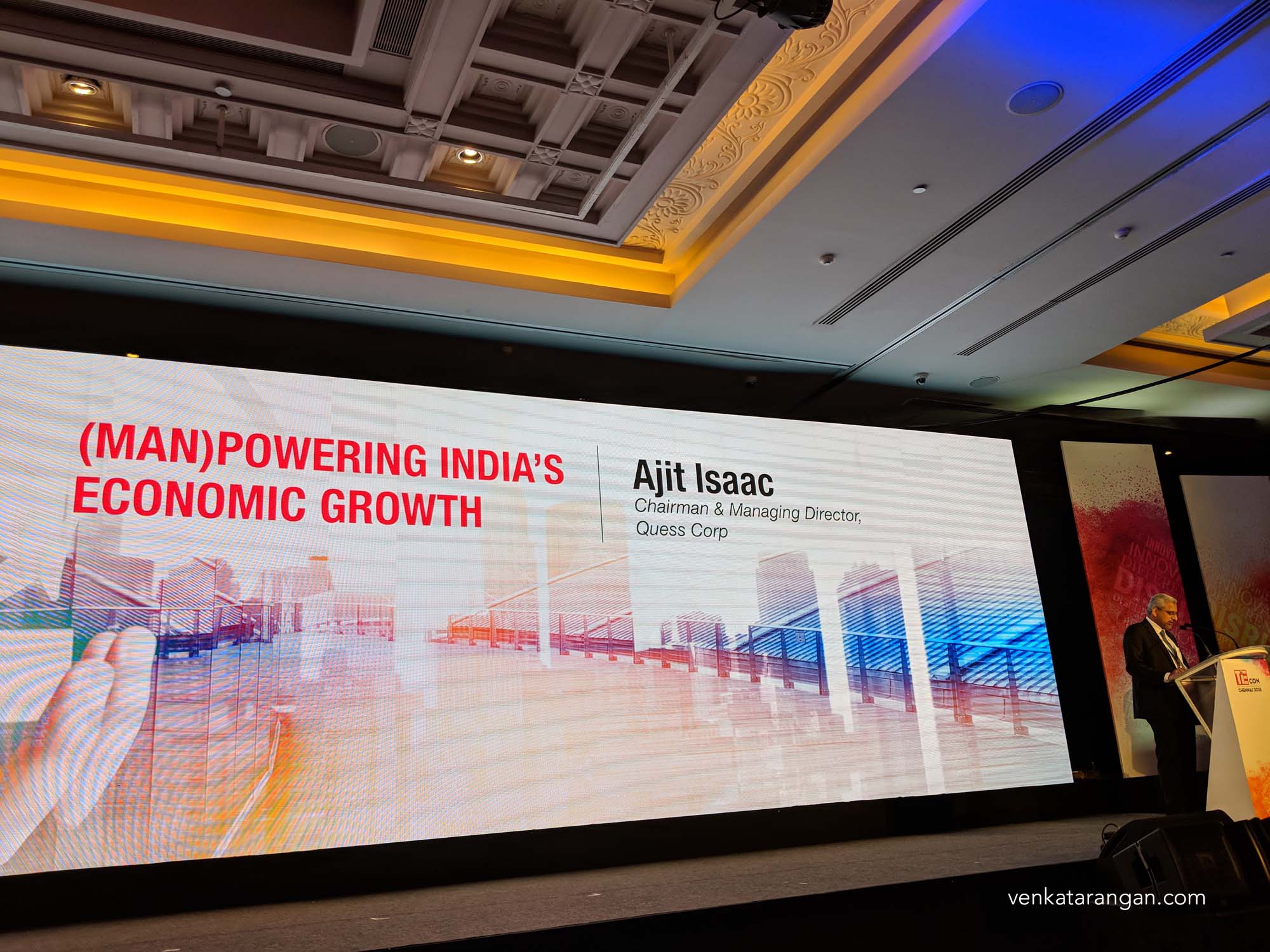
Ajit Isaac, Chairman and MD of Quess Corp
Kumar Vembu, GoFrugal:
[Update: Recording of the talk on YouTube]
I have listened to Kumar Vembu about seven years ago in a phenomenal talk he gave on his experience of developing a product for India.
Today in the panel discussion he talked about:
- Learned what “Yes” of a customer meant in each city of India – say Yes in Mumbai is different from Yes in Bangalore and son. How does Marwadi community in Chennai do business, is different from how the same Marwadi community does business in North India.
- We collaborate with customers. You teach business, we build the best product. We listen very carefully.
- Always I ended up doing things I didn’t know. The bad concoction is one where you have too many variables and when you also had a lot of money on hand like I did when I started GoFrugal.
- Most business owners in India wants to do everything by hand. The software is not a strategic partner. It was a just a tool.
- Each of my salesmen competes with a local neighbourhood business owner, who is selling a bespoke software.
- Forces of Market like VAT, GST helped us.
- Four As – Awareness, Access, Affordability and Availability.
- Return on effort is lowest for the Indian market.
- Doing a product for the Indian market was not easy. If we win in India we can win the World. Indian market will expose your weakness faster and quicker.
- Today we have 25000 clients across 55 countries. The only market we put effort was India, the other 54 countries happened mostly by itself.

Kumar Vembu of GoFrugal
V S Sudhakar, Co-Founder of Big Basket:
[Update: Recording of the talk on YouTube]I love shopping online for fruits and vegetables with BigBasket. The first time I met Sudhakar was about two decades ago, during his days with Fabmart when I was helping them to tweak the performance of their Site Server and SQL Server machines on behalf of Microsoft India. Listening to his journey from 1999 till date is a fascinating one and sure to inspire every entrepreneur.
- With Fabmart they were ahead by a decade+ before the market and Internet penetration in India was ready, in later years their FabMall physical stores were a big hit in Bangalore. Having sold the FabMart/Fabmall he was taking a break when his friends approached him to build a new online grocery store and that’s how BigBasket was formed. Even then, every discussion with investors in the space brought the ghost of Webvan failure which was a US E-Commerce store that was valued over a $1 billion and went burst overnight two decades ago.
- He set his eyes on the standards set by a company in the UK called Ocado for all the important metrics, and today BB team has excelled by several times all these metrics.
- BB team was desperate in implementing processes. In India we are a jugaadi country, our delivery person knows more than all the processes/apps, we need to acknowledge this and double-down on training and measurements.
- Groceries especially Fruits and Vegetables are the most difficult category to crack whether it is online or offline. But if you do it, other categories like private label are easy to follow.
- Today BB brings farm-fresh items in few hours to their customers’ plate. For example, a vegetable harvested by a farmer at 6 A.M. is directly procured by BB in their Sorting and Grading station by 8-11 A.M., packaged by 1-3 P.M and reaches a customer by 8 P.M. the same day.
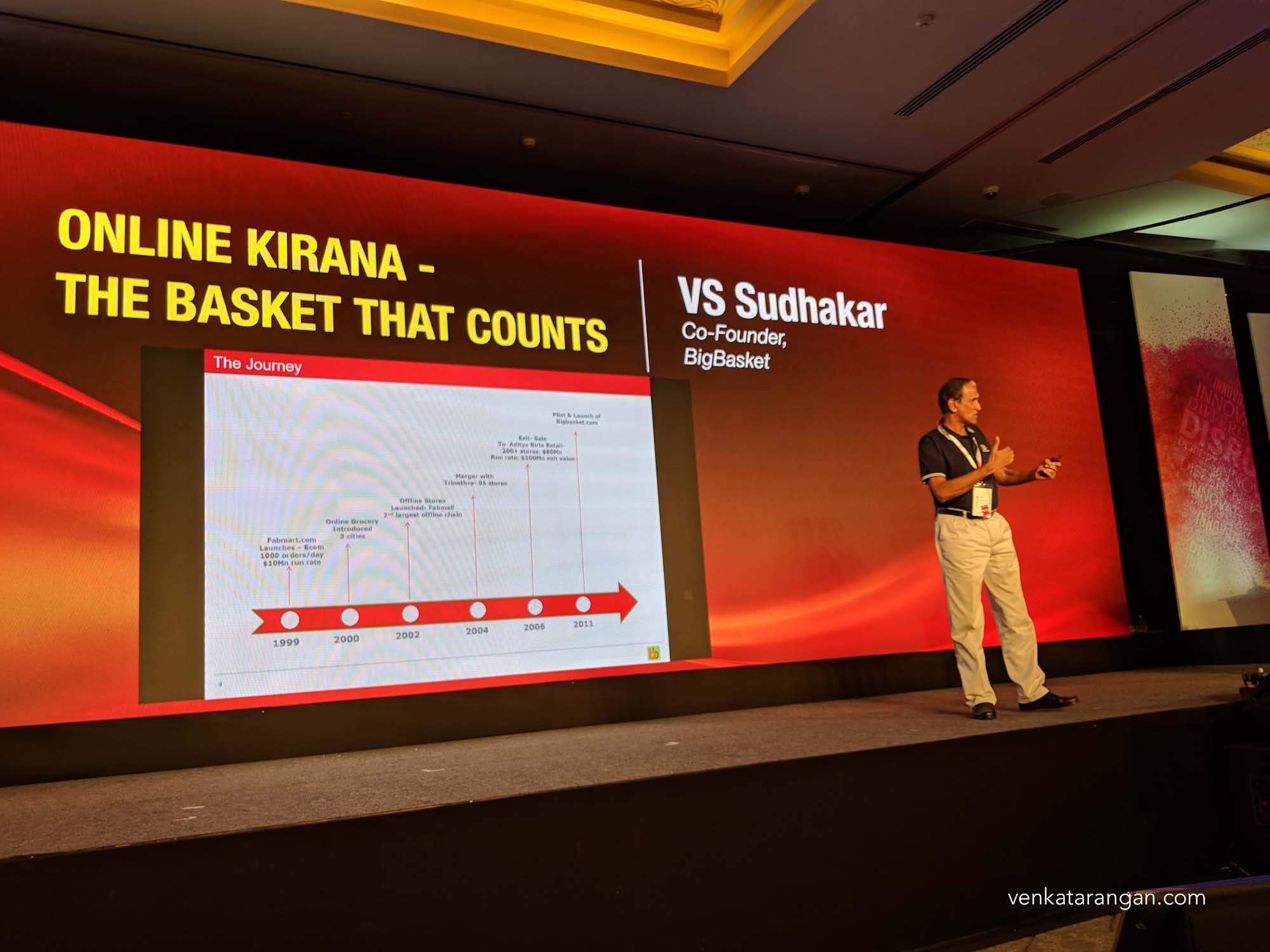
V S Sudhakar, Co-Founder of Big Basket – The basket that counts, a journey over two decades

Big Basket – India’s leading Grocery store
Madan Padaki, Co-Founder and CEO of Ruban Bridge:
[Update: Recording of the talk on YouTube]He talked of his experiences and lessons learnt on unlocking the potential of Bharat, the rural India which we in Urban cities are sure to have understood wrongly.
- The rural Indians unequivocally have said “Don’t push your assumptions on us. The choice of what we buy as villagers’ is ours, we need to be shown the full range of options, not what you think we can afford/will buy”.
- They built a Virtual mall through VR, so that they can take the entire mall to remote parts of India easily.
- For example, Manjunath, a local carpenter in a town of 5000 people does delivery for each of the items he makes over a circuitous route and uses the drive to shout out that this sofa was made by Manju, call me and this is the price. This was his marketing.
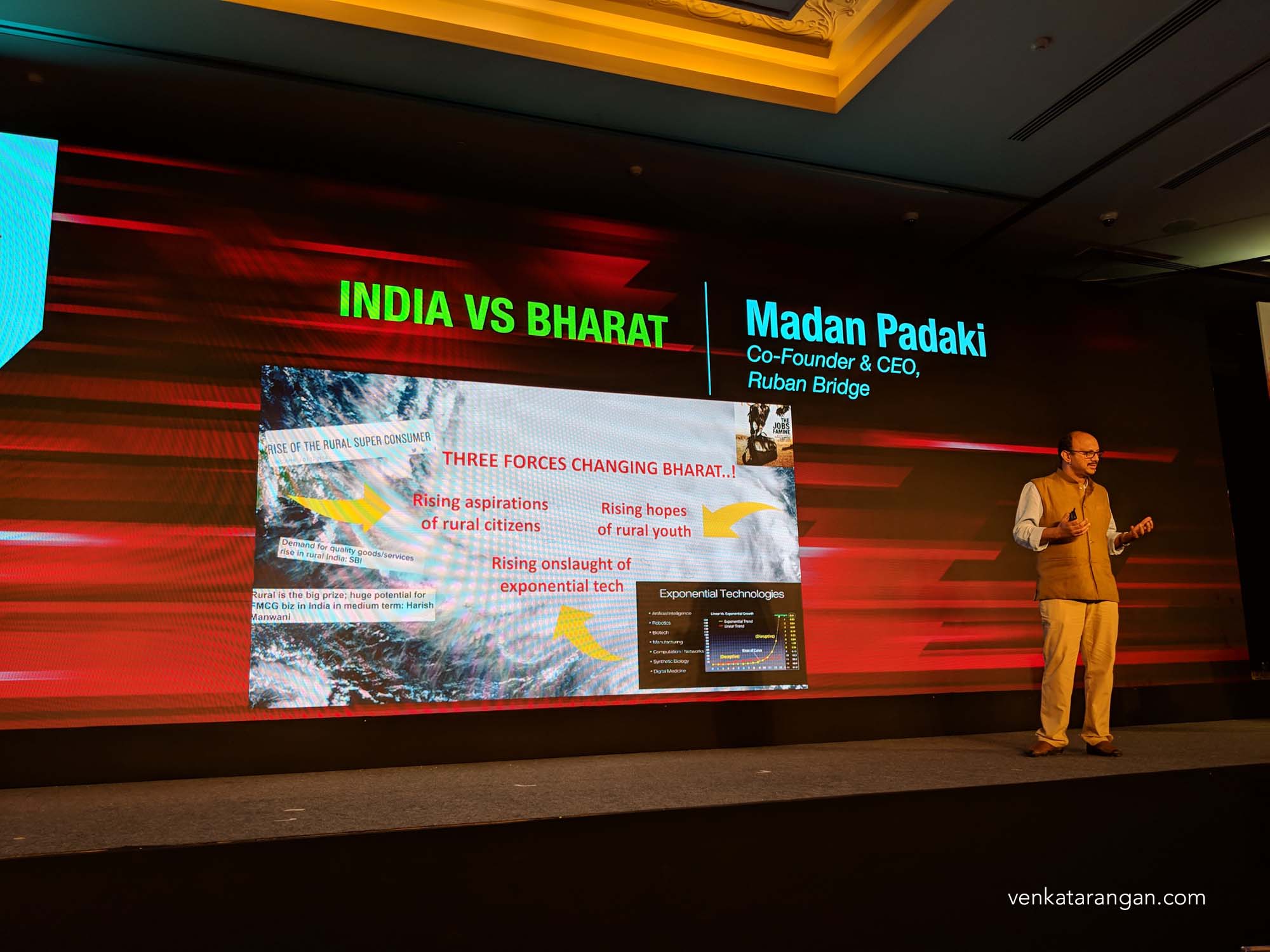
Madan Padaki, Co-Founder and CEO of Ruban Bridge
Bobby Bedi, Owner, Kaleidoscope Entertainment:
- A film is the original startup.
- The term Angel investment comes from Broadway shows, where the producer runs out of money the day before the opening show because they forgot to budget the champagnes and they need to find an angel with wings to save them.
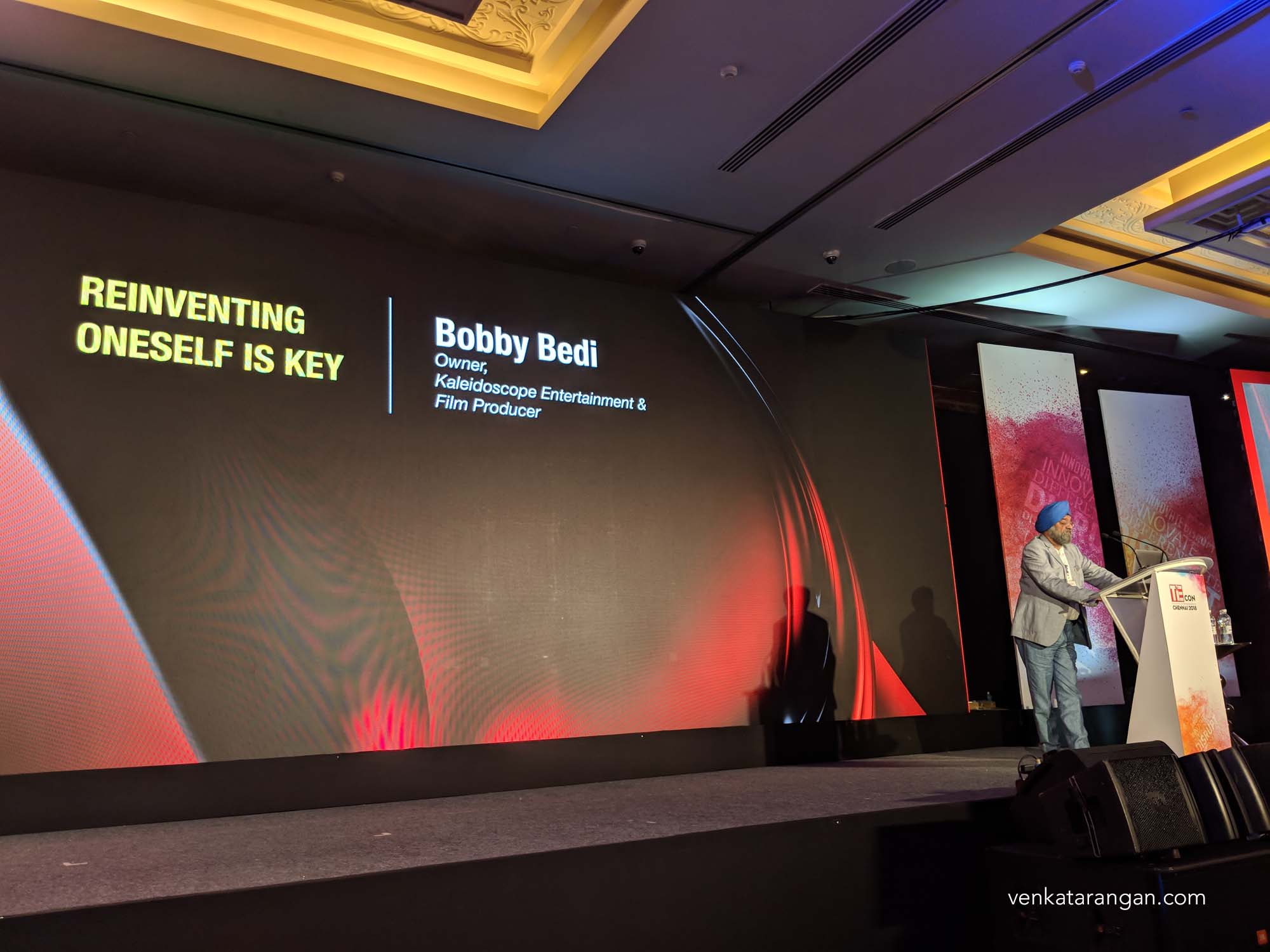
Bobby Bedi, Owner, Kaleidoscope Entertainment
Dr Thillai Rajan A, Professor IIT Madras:
[Update: Recording of the talk on YouTube]Dr Thillai Rajan presented the 10th edition of the report by IIT Madras on the startup ecosystem in India, titled ‘Howzat” it is an extensive study of success and impact of start-ups. Some highlights:
- 1.26 Million companies were formed
- Out of which potential for VC funding is about ~275,000. Venture-funded: 6,214 and exited: 1,624
- Founded and Venture Funded: Bengaluru: 21.7%; Hyderabad: 4.9%; Mumbai: 1.9%; Chennai: 1.2%
- Funded and Exited: Hyderabad: 37.5%; Chennai: 37.1%; New Delhi: 31.8%; Bengaluru: 21.2%
- The first round of funding is higher in Bengaluru, but the subsequent rounds of funding don’t depend much on the location
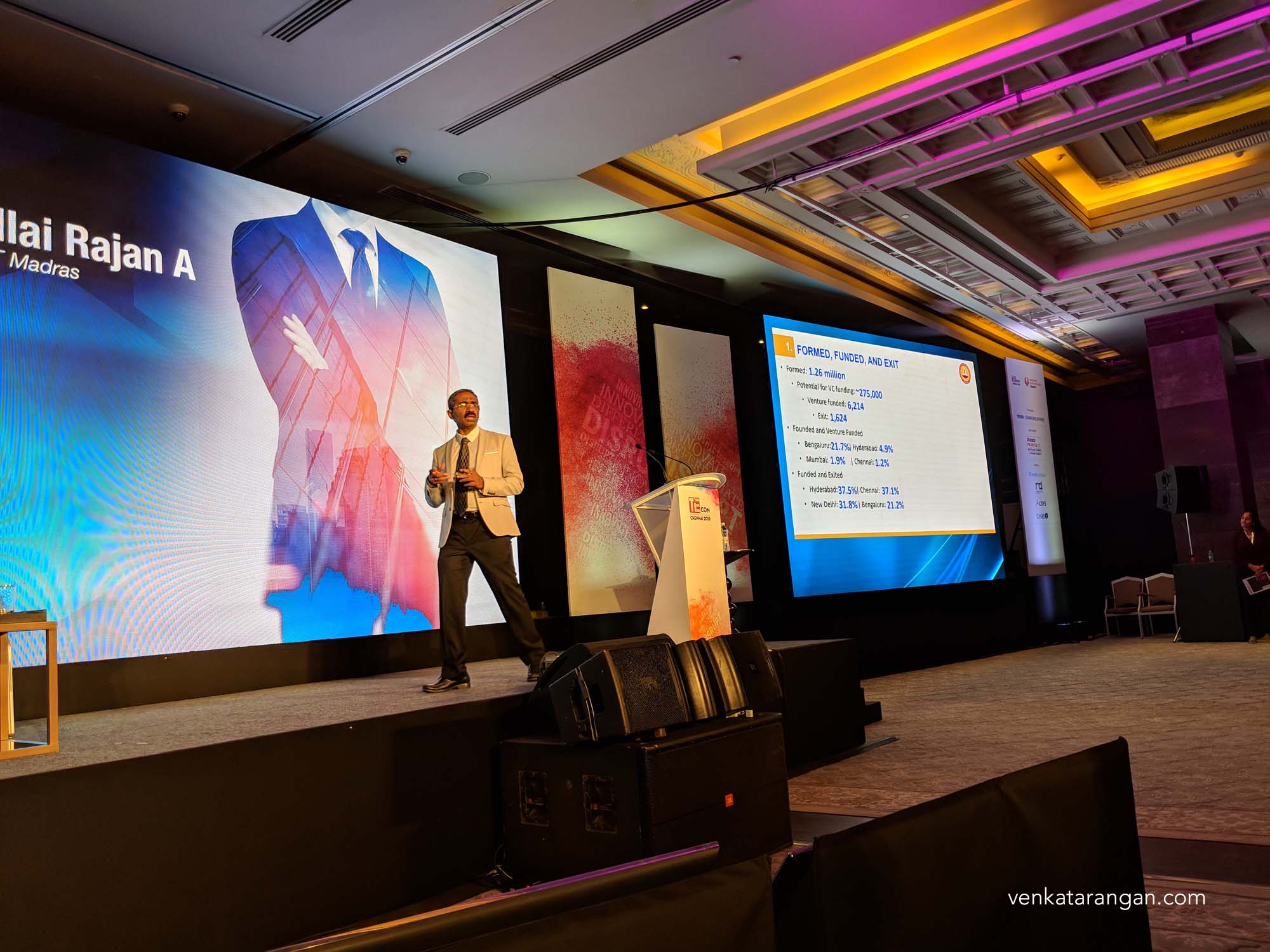
Dr Thillai Rajan A, Professor IIT Madras
A panel discussion hosted by Anu Hasan:
The discussion between the four panellists who ranged from academia to serial entrepreneur & investor was interesting. The panellists were:
- R Krishnakumar, Professor IIT Madras and Mentor of Ather Energy
- Phanindra Sama, Co-Founder, RedBus
- Ramakrishnan S, Founder & CEO of SportsMechanics
- Suresh S Kalpathi, Angel Investor and Film Producer
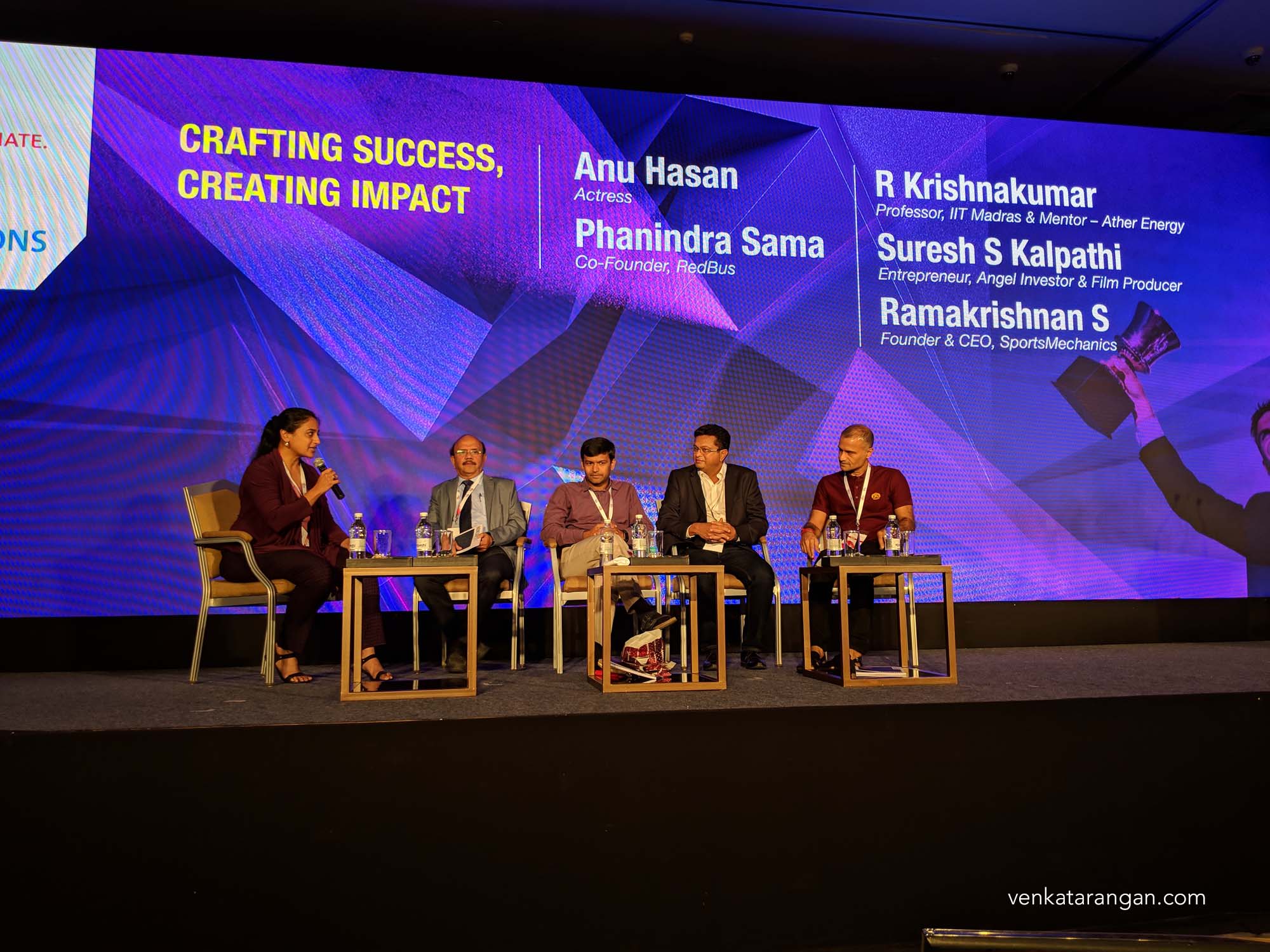
A panel discussion hosted by Anu Hasan


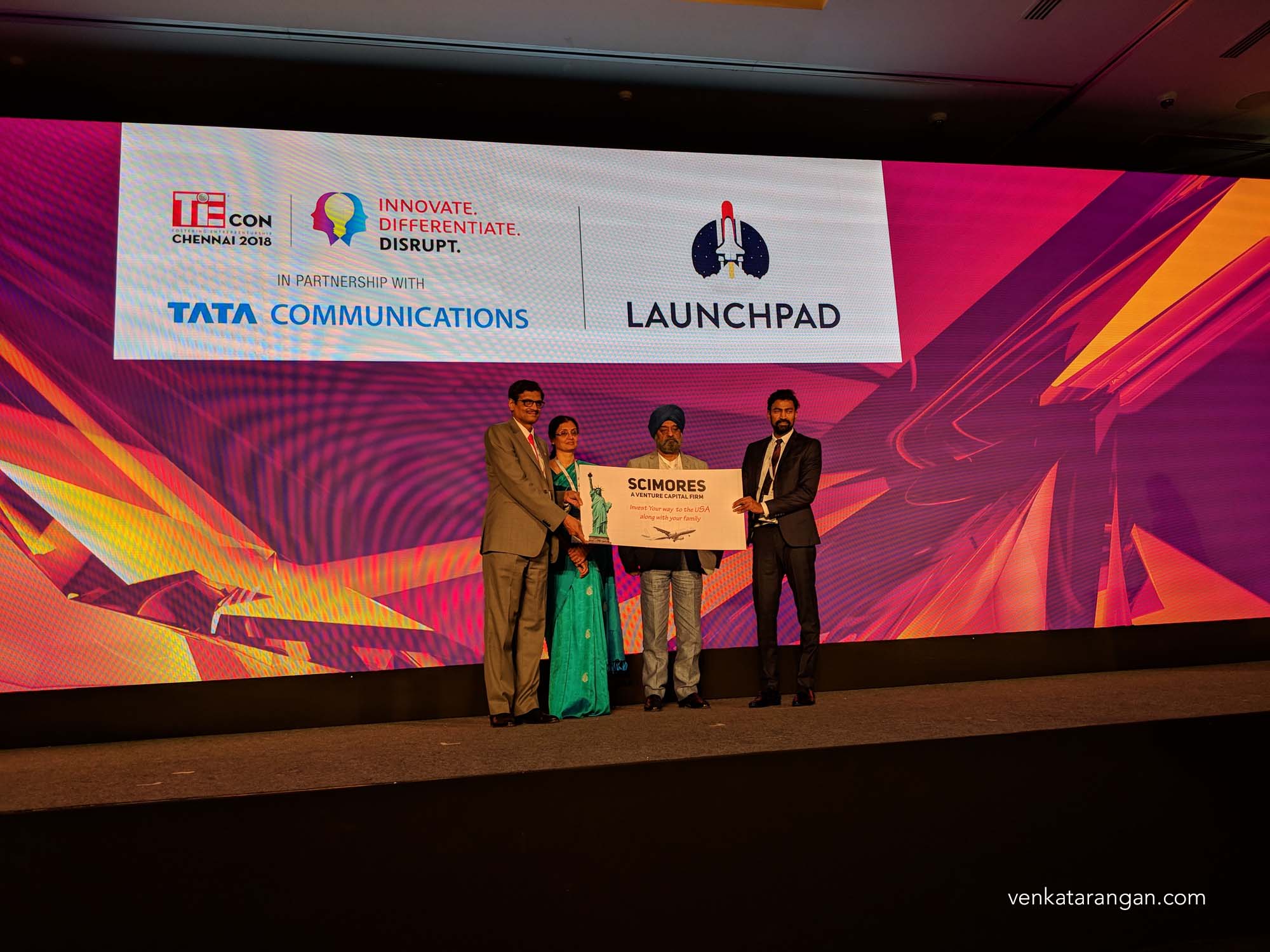
Comments